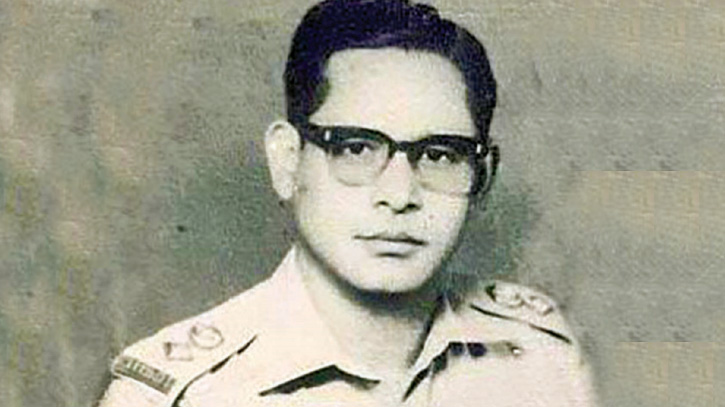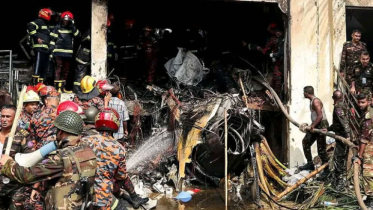
Photo: Lt. Colonel Mohammad Abdul Qadir
Lt. Colonel Mohammad Abdul Qadir, PA-3532, the senior-most army officer to embrace martyrdom in the 1971 Bangladesh war, brushed aside warnings of imminent danger and hoisted a black flag along with the red-green flag with a yellow map of what was then East Pakistan in the early March days after Bangabandhu Sheikh Mujibur Rahman adopted it.
In his office, he saluted the fluttering flag of a country yet to be born, along with his colleagues and local leaders of the Bangladesh Awami League. At his 70-year-old Panchlaish residence in Chattogram, the flag hoisting ceremony was joined by his wife Hena, two children, and the household staff.
Wearing the uniform of the Pakistani army, in which he served for decades, Col. Qadir, nicknamed "Bhashani" by the Punjabis, told everyone, "We will achieve victory ... independent Bangladesh is not far away." This meant he had officially revolted against Pakistan!
Col. Qadir met the Father of the Nation, Bangabandhu Sheikh Mujibur Rahman, in 1968 to pledge his loyalty to the great leader and to the cause of Bangladesh. When his family met and informed Bangabandhu that Col. Qadir was missing and "presumed dead," the great leader wept. He described Col. Qadir as a "great Bengali nationalist and patriot, saying he was a very good officer, and met him with the help of General MAG Osmany, taking a great risk as he was still serving in the Pakistan army, in which he was commissioned in 1950.
He joined his new job in Chattogram in September 1970 and soon after started to work for an independent Bangladesh as per directions of Bangabandhu.
He left his home quietly very early in the morning to join the war against Pakistan, leaving behind his pregnant wife and two children on March 28, 1971, although his son could not give the exact date. He stationed himself in Ramgarh, in the Chattogram Hill Tracts, and returned to see his wife around April 14, 1971.
The Pakistani army came to know about his return and arrested him on April 17, 1971, the day he had planned to leave again to fight. He remained missing and was "presumed dead." His body was found in a mass grave in Chattogram in 2007 by his son, Nadeem Qadir. Qadir's body was exhumed from the mass grave and buried in Qadirabad Cantonment in Natore, with full military honours. The cantonment was named after him in 1983. A stamp was issued with his image by the Government of Bangladesh confirming him as a martyred intellectual, which is now listed in the final gazette published in 2022.
The coffin, wrapped in the flags of the country and the Bangladesh army, was received by Maj Gen M Mahfuzur Rahman, Bogura area commander, and Qadirbad Cantonment Commandant Brig Gen Mohammad Shamsul Alam Khan. He was laid to eternal rest close to the main entrance gate and the Corps of Engineers 1971 Martyrs’ Memorial.
"We finally bid farewell to my father," Nadeem Qadir told reporters on September 22, 2011, the day of the burial. "I offer my gratitude to the Almighty since my father has, at last, received the due honour that he should have received long ago. And this is the most precious achievement of my life: seeing my father being paid tribute."
The Qadirabad Cantonment in Natore was named after him in recognition of his role in Bangladesh's independence war. The government had also issued a postal stamp of him as one of the martyred intellectuals.
As a young captain, Col. Qadir faced court martial for slapping and injuring a Punjabi officer when he called my father, "Ye Bengali, come here." He was acquitted in court when he told the judges that the Punjabi officer had no right to make fun of his real identity as a Bengali.
In 1966, he wrote to Chief of General Staff General Yahya Khan that the Bengali soldiers in the barracks must have rice once a day, instead of roti, which was all right for non-Bengalis. This was in response to an appeal made by Bengali soldiers in his Engineer Battalion in Lahore, Pakistan.
Despite all predictions of him being punished or sacked for making such a proposal by fellow officers, General Khan, later to be known as the Butcher of Bengal, wrote back saying Col. Qadir’s proposal was accepted by the high-ups. Since then, all Bengali soldiers across Pakistan have enjoyed their staple food—rice—once a day.
The same year he was promoted to lieutenant colonel and refused a prize posting to Jordan, Col Qadir chose to become the chief of the Oil and Gas Development Corporation of East Pakistan in 1970. He did it to actively participate in the fight for independence.
Just days ahead of the start of the Bangladesh Liberation War, Qadir gave explosives kept in his office for gas fields to fellow fighters and assisted groups in organising the movement. Shubapur Bridge was blown using the Bangladesh Liberation War, Qadir gave explosives kept in his office for gas fields to fellow fighters and assisted groups in organising the movement. Shubapur Bridge was blown using explosives, and it delayed the entry of the enemy forces into the port city.
He was married to Hasna Hena Qadir, one of the founders of the Ekattorer Ghatak Dalal Nirmul Committee, an organisation that has been demanding the trial of 1971 war criminals. His elder son, Nadeem Qadir, is the editor of the Daily Messenger.
TDM/MI








